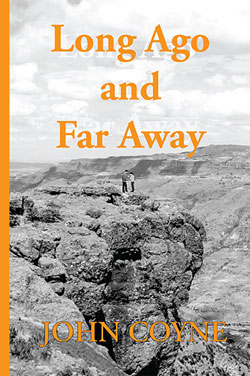Grab Your Reader by the Throat

by John Coyne (Ethiopia 1962-64)
I am a great believer in writing an opening sentence or opening paragraph that hooks the readers and keeps them reading. Writing have change from when a writer could move leisurely into a tale and keep the attention of a reader with long narrative and descriptive sentences.
Anytime you are anywhere — glance around — you’ll see people reaching for their iphone, checking messages, national news, or just the weather. No one, it seems, has the time or patience to read anything longer than an email.
Today, no reader wants to turn a page of prose unless the next page is promising more surprises.
Readers want what they’re reading to be fast, funny, or forget it.
Here is what I mean. I have written these openings to grab the reader by the throat and keep him or her reading.
This is a short story I published in 1989 entitled Flight. The first paragraph is three sentences, a total of 67 words.
My son slept. He slept without moving, without breathing it seemed, and several times I reached over in the dark front seat of the car to feel for the tiny warm puffs of his breath on my palm. My terrifying fear was that he would die right there and then, on the back roads of Virginia, after everything I had done to steal him from his mother.
This short story — one I published in 1993 — is entitled Snow Man. The first paragraph is two sentences, 30 words.
When Marc entered the classroom, “peace corps go home” had already been written on the blackboard. It was neatly done, and that eliminated all but two of the Ethiopian students.
Another example. A story entitled The Devil You Know, published in 2018. The opening paragraph is one sentence, 62 words.
It began with Father Sweeney leaning into Matt’s face, with both hands braced against the desk, speaking in his deliberately condescending way, telling Matt once, and then again — never raising his voice, letting his words work like a butcher’s knife across the boy’s sense of self — that he wanted what Matt Garrity was hiding between his legs and he wanted it now!”
Now how do you use this approach with a novel, or a memoir? The same way. You might need a full page of prose or a chapter, but grab the reader by the throat.
 Here are a couple examples of my opening pages. This is a novel I published in 1978. It launched my writing career. The title is The Piercing (Putnam). The opening page is two paragraphs, 146 words.
Here are a couple examples of my opening pages. This is a novel I published in 1978. It launched my writing career. The title is The Piercing (Putnam). The opening page is two paragraphs, 146 words.
The land was called The Hand of God for it seemed as if God himself had grabbed that remote corner of the southern state and crushed the terrain in his palm and fingers, shaping the valleys, the hollows, and the far mountains with his Almighty strength. The capital was squeezed into the heel of the hand and a new highway left the city, cut across the dry flat palm, and then switchbacked up the ridges to the town of Mossy Creek at the top of the rift.
The town hugged the ridge at the second finger of The Hand. It was only a single street wide and just a few miles long and curved around the ridge, stopping at the edge of the rift. Beyond the town a thin road, bending like an arthritic finger, poked into the thick woods and disappeared in these Appalachia Mountains.
Another example is the opening page of one of my golf novel, published in 2008. This novel is entitled The Caddie Who Played With Hickory.
As I’ve grown older I have come to realize that what is most important to me is not what I daily forget but what I remember. And what I recall from years ago come back to me so intensely that I imagine I can reach through time and distance and change with a few words, a gesture, or even a smile, the lives we all once lived.
“This fantasy enriches my days but also troubles me with its what-ifs. I will let you decide if I was wrong—‘needlessly romantic,’ as Clare always said—or if I was the only one who fully understood what was happening that summer of 1946, the summer when the great Walter Hagen came back to Midlothian Country Club to play the last important golf match of his life.
Then there is my novel Long Ago and Far Away published in 2014 (Peace Corps Writers). The opening paragraph, 92 words, sets the story in motion.
 Someone had taken his time to print out the name of my bookstore — “Something to Read” — and the Main Street address in elaborate calligraphy on a padded brown envelope. There was no return address. Inside there was no note or letter of explanation. It was rare that anyone, for any reason, mailed me a single book, even a first edition. I tugged a thick paperback from the envelope. It was only when I turned the book over and saw the word Ethiopia in the title that I realized it was Irish’s book.
Someone had taken his time to print out the name of my bookstore — “Something to Read” — and the Main Street address in elaborate calligraphy on a padded brown envelope. There was no return address. Inside there was no note or letter of explanation. It was rare that anyone, for any reason, mailed me a single book, even a first edition. I tugged a thick paperback from the envelope. It was only when I turned the book over and saw the word Ethiopia in the title that I realized it was Irish’s book.
In this novel, and in all my books, fiction and non-fiction, I want to launch the reader immediately into the story.
I read somewhere how around 14 B.C., the Roman poet Horace observed that writers should attempt “to say at once what ought to be said.”

shutter stock
In other words, grab your reader by the throat with your opening sentences. If a Roman poet tells us what to do, then we should do it!
Point taken and appreciated John. Great leads all of them and especially the arthritic finger 🙂
You are absolutely right about capturing a readers’ imagination in the first sentences of your story. It frightens me terribly when I write and I usually torture that first sheet of paper without mercy. I will return again and again to those first words adding further indignities.
The article also grabs you by the throat. The suggestions and specific examples are perfect show and tell advice for anyone who wants to write. I’ve read several of the mentioned books and loved them. Long Ago and Far Away turned out to become gifts to a couple of friends who also loved the story. And yes, it grabbed me by the throat and I didn’t look up until I finished the book late that night.
This is great stuff — enjoyable examples that make your point. I’m obsessed with leads in journalism…constantly harassing our writers at East Village Magazine to write better, more concise, clearer openings for their stories — the criteria for a good first paragraph similar in journalism to fiction writing. I’ve been known to holler “But WHAT HAPPENED???”
John, this is a great article. A catchy title, such as yours is pivotal. I struggled with my first paragraph for years in my first book, a memoir, In Search of Pink Flamingos. I attended many writing conferences and workshops from some of the greats in the Northwest. I dabbled with my beginning paragraph to only be shot down by the agent teaching the workshop. He wanted nothing to do with it. I was close to letting my manuscript mildew on my hard drive. I knew it was a great story. But the question was how to catch the reader who cared nothing about who I was as a writer or my story for that matter. I landed on this beginning sentence and it seemed to succeed – “We never had pink flamingos on the farm in Nebraska….” I have won two awards for this book. My story was read and appreciated by many. That is what I had hoped for. Thanks to PCW for awarding me with the PC Memoir of the Year award – 2021.
I devoured your book! Such an amazing story!
Mark kissed me like he meant it, like he had Jason not two hours earlier. I believed him. Jason didn’t. Which of us was the better for it?